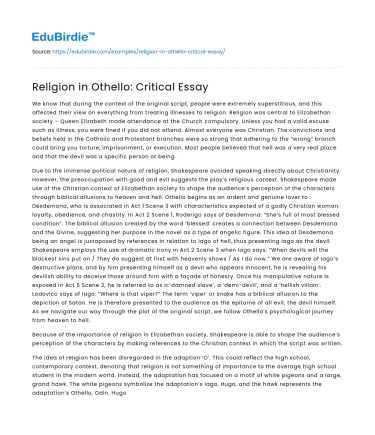We know that during the context of the original script, people were extremely superstitious, and this affected their view on everything from treating illnesses to religion. Religion was central to Elizabethan society – Queen Elizabeth made attendance at the Church compulsory. Unless you had a valid excuse such as illness, you were fined if you did not attend. Almost everyone was Christian. The convictions and beliefs held in the Catholic and Protestant branches were so strong that adhering to the “wrong” branch could bring you torture, imprisonment, or execution. Most people believed that hell was a very real place and that the devil was a specific person or being.
Due to the immense political nature of religion, Shakespeare avoided speaking directly about Christianity. However, the preoccupation with good and evil suggests the play’s religious context. Shakespeare made use of the Christian context of Elizabethan society to shape the audience’s perception of the characters through biblical allusions to heaven and hell. Othello begins as an ardent and genuine lover to Desdemona, who is associated in Act 1 Scene 3 with characteristics expected of a godly Christian woman: loyalty, obedience, and chastity. In Act 2 Scene 1, Roderigo says of Desdemona: “She’s full of most blessed condition”. The biblical allusion created by the word ‘blessed’ creates a connection between Desdemona and the Divine, suggesting her purpose in the novel as a type of angelic figure. This idea of Desdemona being an angel is juxtaposed by references in relation to Iago of hell, thus presenting Iago as the devil. Shakespeare employs the use of dramatic irony in Act 2 Scene 3 when Iago says: “When devils will the blackest sins put on / They do suggest at first with heavenly shows / As I do now.” We are aware of Iago’s destructive plans, and by him presenting himself as a devil who appears innocent, he is revealing his devilish ability to deceive those around him with a façade of honesty. Once his manipulative nature is exposed in Act 5 Scene 2, he is referred to as a ‘damned slave’, a ‘demi-devil’, and a ‘hellish villain’. Lodovico says of Iago: “Where is that viper?” The term ‘viper’ or snake has a biblical allusion to the depiction of Satan. He is therefore presented to the audience as the epitome of all evil; the devil himself. As we navigate our way through the plot of the original script, we follow Othello’s psychological journey from heaven to hell.
Save your time!
We can take care of your essay
- Proper editing and formatting
- Free revision, title page, and bibliography
- Flexible prices and money-back guarantee
Because of the importance of religion in Elizabethan society, Shakespeare is able to shape the audience’s perception of the characters by making references to the Christian context in which the script was written.
The idea of religion has been disregarded in the adaption ‘O’. This could reflect the high school, contemporary context, denoting that religion is not something of importance to the average high school student in the modern world. Instead, the adaptation has focused on a motif of white pigeons and a large, grand hawk. The white pigeons symbolize the adaptation’s Iago, Hugo, and the hawk represents the adaptation’s Othello, Odin. Hugo narrates that he wishes to be a hawk-like Odin. Thus, the interpretation of the original script has shifted and changed with time and place to reveal that religion is not key in a contemporary context, but aspiring to be like someone else is more relevant to contemporary society.
Women were regarded as possessions in the Elizabethan context, and they are still regarded as possessions in domestic abuse situations in a contemporary context. Xenophobia existed in the Elizabethan context; and xenophobia still exists today in a multitude of forms, including race and religion. Religion was crucial in the Elizabethan context in understanding the perception of Shakespeare’s characters; but in a contemporary context, this idea has been removed, and contemporary ideas of aspiring to be something else are brought forward. By modernizing Shakespeare’s Othello and connecting it to a contemporary context, we can see how themes of women as possessions, xenophobia, and religion that were prevalent in the Elizabethan context have been interpreted in new adaptations as shifting and changing with time and place.






 Stuck on your essay?
Stuck on your essay?

